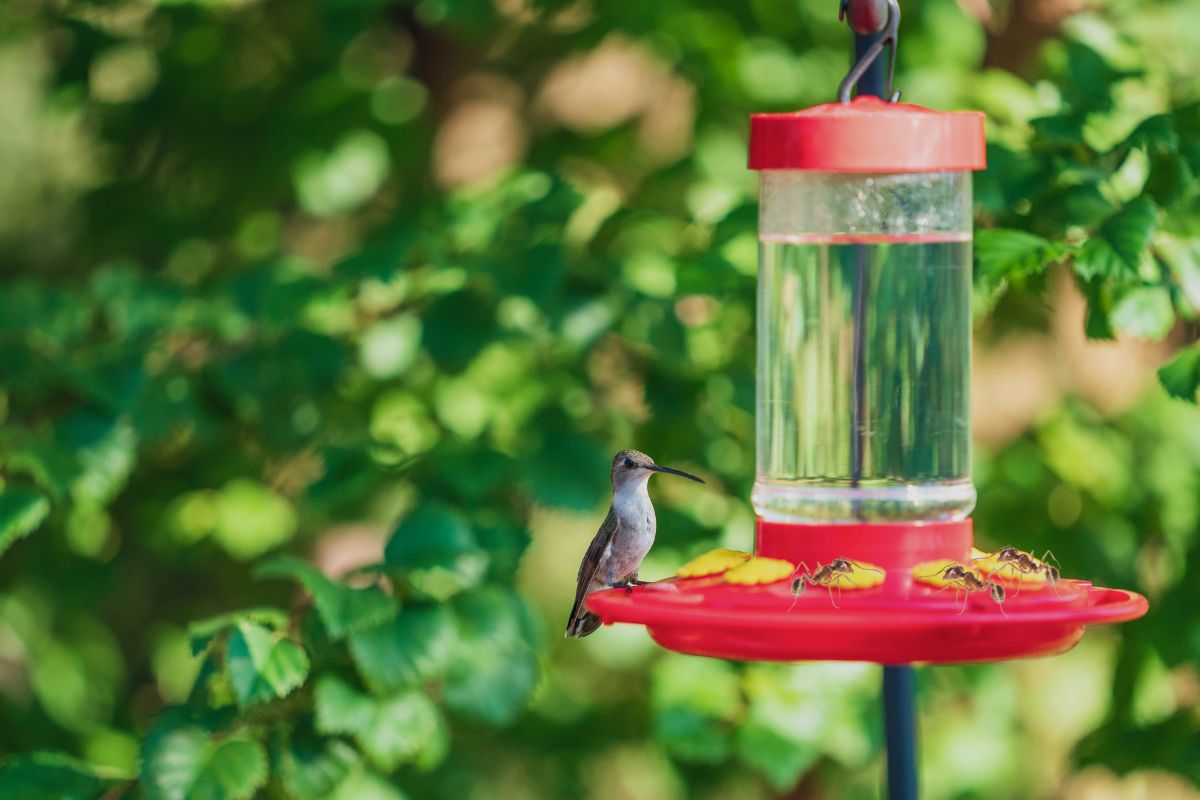If you have a passion for hummingbirds, the last thing you want to see is ants swarming your feeder. Unfortunately, this is a common problem for many hummingbird enthusiasts. However, there are several effective ways to keep ants off your hummingbird feeder so you can enjoy watching these beautiful birds in peace.
- Relocate the Feeder: If your feeder is close to trees or other structures, ants are more likely to climb up and reach it. To prevent this, move the feeder away from any structures and ensure it is not near any trees. This will reduce the risk of ants reaching your feeder.
- Use Ant Traps or Baits: Ant traps and baits are effective in keeping ants away from your hummingbird feeder. These traps contain food that attracts ants, which they then take back to their colony. The bait will kill them off, preventing them from reaching your feeder.
- Install an Ant Moat: An ant moat is a device that can be attached to the feeder. It consists of a container filled with water that ants cannot cross. This creates a barrier that prevents ants from reaching the nectar without passing through the water.
- Apply Sticky Substances: Use petroleum jelly or wax on the poles that hold up the feeder. This makes it difficult for ants to climb up as they get stuck on the substance and cannot reach the nectar.
- Change the Nectar Frequently: Regularly changing the hummingbird nectar is important to prevent ants. Old nectar can attract ants, so refresh the nectar every few days to keep them away.
- Hang the Feeder Higher Up: If possible, hang the feeder higher off the ground. This reduces the risk of ants reaching it, as they cannot access anything higher than their own height.
- Use Insecticides or Pesticides: Insecticides or pesticides can be effective in keeping ants away from the feeder. Follow the instructions on the product packaging and use them in well-ventilated areas away from people and pets.
- Avoid Overfilling the Feeder: Do not overfill the feeder with too much nectar, as this can attract ants and other unwanted guests. Spilled nectar can also become a breeding ground for pests.
- Regularly Clean the Feeder: Keeping the feeder clean is essential to keep ants away. Regularly clean and disinfect the feeder to remove any odors or sugars that could attract pests.
- Rinse with Boiling Water: For a deep clean, rinse the feeder with boiling water each time you refill it with nectar. This kills any bacteria or germs and helps keep pests away.
- Maintain a Clean Yard: Keep your yard clean and free of debris to reduce ant activity. Remove any potential food sources that could attract ants to your yard and near your feeders.
- Plant Mint Around the Feeder: Mint has strong aromas that many pests, including ants, find unpleasant. Planting mint around your feeders creates a natural barrier between them and the insects.
- Create a Barrier with Sand or Talcum Powder: Create a barrier of sand or talcum powder around the feeders to prevent crawling insects from reaching them.
- Place Foil Near the Feeder: The reflective quality of foil creates bright light that insects find uncomfortable. Placing foil near the feeder can help repel unwanted guests.
- Use a Pinwheel: The spinning motion of a pinwheel deters ants from getting too close to the feeder. Keep it at a safe distance to avoid any harm to the birds.
- Remove Ants Immediately: If you see ants on or near the feeder, remove them immediately. This reduces the attraction for other ants and keeps the feeders ant-free.
- Seal Cracks or Gaps: Fill in any cracks or gaps around your home or decking with caulk or sealant to prevent ants from entering and reaching the feeders.
- Choose Ant-Proof Feeders: Consider investing in a hummingbird feeder specifically designed to keep out ants. These feeders often have built-in features like ant moats to prevent ants from reaching the nectar.
By following these tips, you can keep ants off your hummingbird feeders and enjoy watching these beautiful birds without any disturbances from crawling insects.
